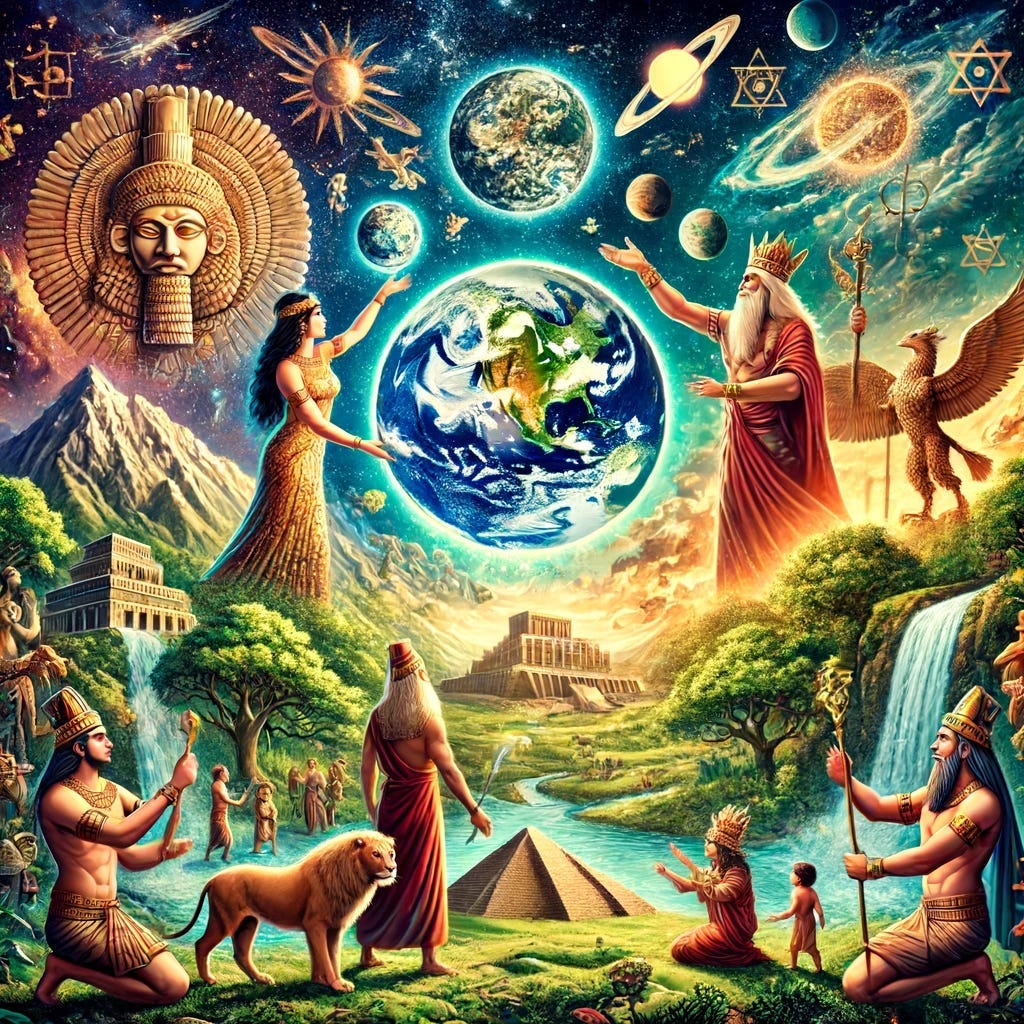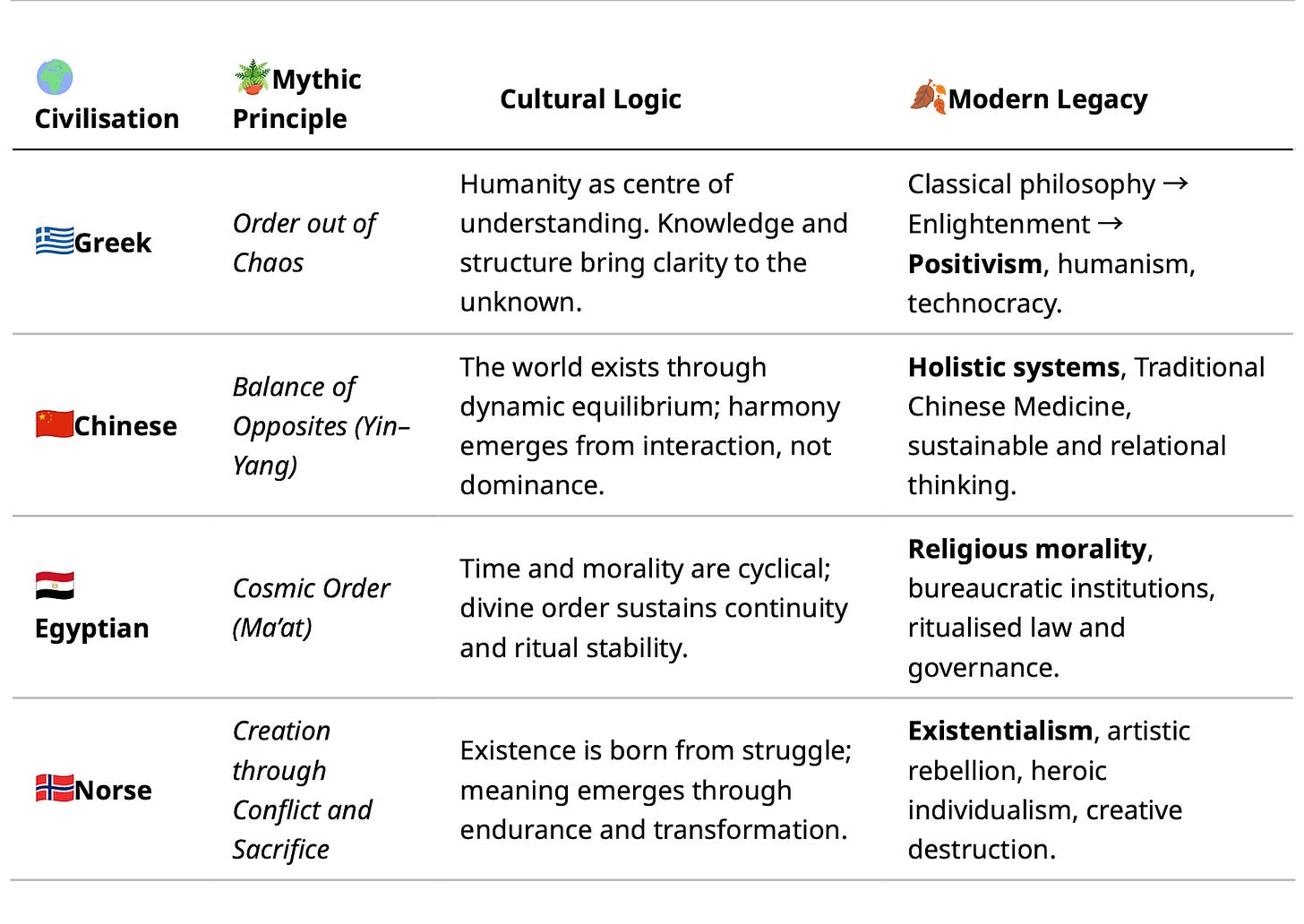From Chaos to Code: How Creation Myths Became the Cultural Operating Systems
Tracing how ancient cosmologies continue to shape today’s and tomorrow's systems of thought, values, and progress.
🎟️ Paid Subscriber Offer
For a limited time, new readers can join Code Uncovered with a 20% annual discount.
Subscribers receive:
✨ Two in-depth analyses each month.
📚 Full access to the archive of 80+ articles.
💬 Participation in community discussions on meaning, semiotics, and futures.
🌍 Introduction: The Myths Beneath Our Modern Minds
Every civilisation begins with a story explaining how something came to be.
Those stories were not primitive fantasies—they were early models of meaning, mapping human experience into structure. Myths were the first operating systems of civilisation, encoding logics that would shape philosophy, governance, and culture for centuries to come.
History is never past; it is a mirror of what lies ahead.
The myths of creation are not archives of forgotten gods—they are early indicators of future realities, prototypes of how societies understand power, order, chaos, and transformation. Their influence continues to echo through politics, economics, religion, and the cultural codes we live by.
“A nation that does not know its past has no future.”
— Mustafa Kemal Atatürk (1881–1938), founder of the Republic of Turkey and a visionary reformer who modernised his nation through secular, scientific, and cultural transformation. Yesterday marked the 87th anniversary of his passing—a reminder that the past is not a burden, but a compass for designing the future.
🏛️ The Semiotic Genealogy of Creation
Across civilisations, creation myths were blueprints for thought.
They did not simply describe how the world was made—they prescribed how the world should be understood. Each myth expressed a unique cognitive architecture that still governs how cultures interpret truth, progress, and morality today.
🇬🇷 Greek: From Chaos to Logos
The Greek creation myth begins with Chaos, a vast formless void, and proceeds toward Cosmos—the structured universe governed by reason. Creation is an act of ordering, the imposition of logic upon disorder.
That mythic logic survives in Western philosophy’s conviction that reason can conquer uncertainty.
Rationalism, geometry, and the scientific method are cultural extensions of this narrative—to know is to control, to classify is to exist.
This logic gave birth to humanism and, later, to positivism—the belief that truth lies in measurement and empirical observation. However, it also gave rise to our modern discontent: a faith that all chaos can be solved through systems, spreadsheets, and science.
🇨🇳 Chinese: The Dance of Dualities
The Chinese cosmos emerges not from chaos but from balance. The world is formed through the interaction of Yin and Yang, light and shadow, rest and movement. Here, creation is not separation—it is relationship.
This worldview encodes a philosophy where harmony is not the absence of conflict, but its dynamic resolution.
From this principle evolved Traditional Chinese Medicine, Confucian ethics, and the philosophy of holistic balance that informs ecology and systems thinking today.
The Western mind often seeks a winner between opposites; the Chinese mind seeks a rhythm between them.
In an age of polarisation, this mythic wisdom feels prophetic. It tells us that contradiction is not collapse—it’s continuity.
Keep reading with a 7-day free trial
Subscribe to Code Uncovered to keep reading this post and get 7 days of free access to the full post archives.



